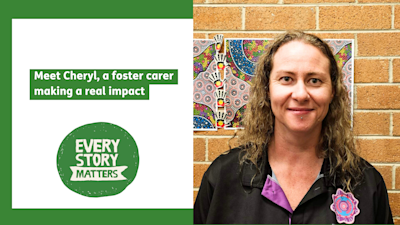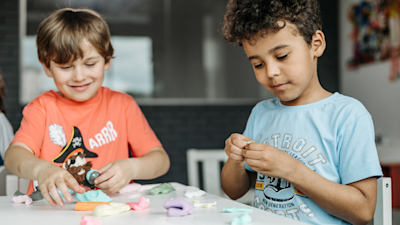"Thank you to our dedicated carers, you make an enormous difference in the lives of children." Teena Ingram, Child Youth and Family.

Image: A young person with nose piercings, short brown hair, and a khaki t-shirt looks into the camera.
Did you know there are more than 6,000 foster and kinship carer families in Queensland providing care and support for young people in need? Thousands of incredible people are doing their part to keep children and young people safe.
This week, 4–11 May, is Queensland Foster and Kinship Carer Week, and Teena Ingram, Executive Director, Queensland Child Youth and Family, had the following to say to all our carers, those currently providing care, those who have retired, and those yet to join.
"Foster and kinship carers are such a valuable part of the care team wrapping around children and young people who can’t live at home with their own parents for a time," said Teena.
"They open their hearts and homes to children who need a safe and caring family to nurture them. It is both challenging and rewarding and we can’t thank you enough for choosing to volunteer your homes and love."
"The sad fact is that there are many more children needing a safe home with carers for a time than we have carers able to take them in."
With nearly 50,000 children unable to live safely at home in Australia each year, we are always looking for more incredible people to become foster carers.
Jane French, Deputy Chief Executive Child, Youth and Family at Life Without Barriers said,
"When we reflect on the positive journey of young people in care, the most significant influence invariably stems from the unwavering dedication and love of a foster carer."
"In conversations with those who have transitioned out of care, they often fondly recall that one carer who kicked the ball, cooked spaghetti bolognese, and sat beside them after a challenging day at school."
"It's these seemingly small moments that hold the greatest significance. I extend my deepest gratitude to every foster carer who has lovingly brushed hair and tied shoelaces day after day. Your selfless acts of care and kindness are truly invaluable, and for that, I can never thank you enough."
Ange is one of those wonderful foster carers in Ipswich, Queensland, and she is putting the call out for more people to get involved.

Image: Ange and Matt at the National Foster Care Conference in Hobart, Tasmania 2023. Ange is wearing a blue jumper and Matt is wearing a Life Without Barriers' Reconciliation t-shirt.
"At the moment, there are just not enough foster carers in Ipswich. Many children, including younger children, are going into residential homes, which is not ideal. We're desperate for all types of carers at the moment," said Ange.
"We really need people who are willing to provide care, for short term, long term, whatever, we need them all!"
What you have asked about becoming a foster carer in Australia
How do I become a foster carer in Queensland?
If you want to be a foster carer in Queensland, you need to tick a few special boxes including being at least 18 years old and all household members over 18 receiving a Blue Card Clearance. Life Without Barriers can walk you through the application process, which includes background checks, interviews, home visits and training!
You can become a foster or kinship carer if you are single, partnered, gay, straight, young, or senior—it doesn’t matter to us! If you desire and have the capacity to provide a safe, respectful, and caring environment for children and want to welcome children into your home and life, you could be a good fit, and we want to hear from you.
"Across Queensland, there is a desperate need for carers to provide short-term, emergency, or long-term care. If you have ever thought about enquiring, I encourage you to take that leap today and reach out to us to learn more," said Teena.
What type of foster care is available in Queensland?
In Queensland, different types of care include emergency care, short-term care, long-term care, respite care, and kinship care. We know that providing care works differently for different people.
The type of care provided depends on the needs of the child and their family. Our specialist staff work with children and alongside carers when additional support is needed. Life Without Barriers has a multidisciplinary team of specialist staff, including Youth Workers, Cultural Support Planners, Therapeutic Specialists, and Education Support Workers. The team of specialists supports each child or young person depending on their specific needs and care plan goals.
Gillian is a paediatric nurse and a foster carer in Queensland who utilises some of these specialist supports. Gillian cares for children with disabilities and/or complex challenges and behaviours. She shared that one of the most important things you can give a young person is your time.
"Really, it was getting back to that basic stuff, just being there for them," Gillian said.

Image: Gillian, a woman with short dark hair, wears a white t-shirt and smiles at the camera whilst standing against a fence.
Is there kinship care in Queensland?
Yes! Kinship carers are very special carers who are related to the child or may be members of a child's community. It is so important to keep families together whenever possible.
Kinship carers can be grandparents, aunts, uncles, other relatives, or friends. For Aboriginal and Torres Strait Islander children, kinship care may include another Aboriginal person or Torres Strait Islander who is a member of the young person’s mob.
What support is available for foster carers in Queensland?
Foster and kinship carers in Queensland receive ongoing support, including a dedicated Child and Family Practitioner, training, and access to support groups. They also receive financial assistance to cover the costs of caring for the child.
Life Without Barriers carers are never alone in their caring journey.
It can be difficult to comprehend the experiences children bring with them, so it is important that carers feel supported and confident in their role.
We provide carers with a range of learning opportunities suited to their level of experience and the needs of the children in their care. This includes access to a wide range of eLearning options on topics such as child development, understanding trauma and stress, and healthy living.
Life Without Barriers carers have access to on-call support at any time of the day or night for advice, support and direction in any situation.
Can I choose the age and gender of the child I foster in Queensland?
Foster carers in Queensland can specify the age range and gender of the children they think will best fit into their family. We consider many factors, but the main one is what will be best for the child or young person who needs support. Factors include whether there are currently any children living in your home, their age, and gender.
Sophiaan, who provides long-term foster care in Queensland, highlights the importance of everyone respecting each other in a home and why finding the right fit matters.
"It is vital for us to show respect to the child we care for, as well as model it in our own partnership. We always try to respect privacy, personal preferences and the need for time and space when indicated," says Sophiaan.
"Above all, we respect him as a human being with complex needs and wants, fears and vulnerabilities."

Do I need to own my own home to become a foster carer in Queensland?
No, you do not need to own your own home to become a carer in Queensland. Foster and kinship carers can be renters or homeowners!
Can I still work if I become a foster carer or kinship carer in Queensland?
Yes, many foster and kinship carers in Queensland work either full-time or part-time while caring for children. Support is available to help manage the challenges of balancing work and caring responsibilities.
Do I receive financial support as a foster carer in Queensland?
Yes, foster carers and kinship carers in Queensland receive financial support to cover the costs of caring for a child, including food, clothing, and other essentials.
How long does a child stay in foster care in Queensland?
The length of time a child spends in foster care in Queensland varies. It can range from a few days (respite or emergency care) to several years (long-term), depending on the child's circumstances and their family.
Can I adopt a child I am fostering in Queensland?
In some cases, foster carers in Queensland may be able to adopt a child whom they have been fostering if it is in the best interests of the child and they meet the requirements for adoption. However, reunification is the goal whenever possible. A child growing up with their family and community is what we strive for.
If you are interested in becoming a carer with Life Without Barriers, you can contact our foster care specialists who are ready to answer your questions. Whether you're looking to start the process or just want more info, our team can help.
You can call us at 1300 592 227 or email carers@lwb.org.au.


